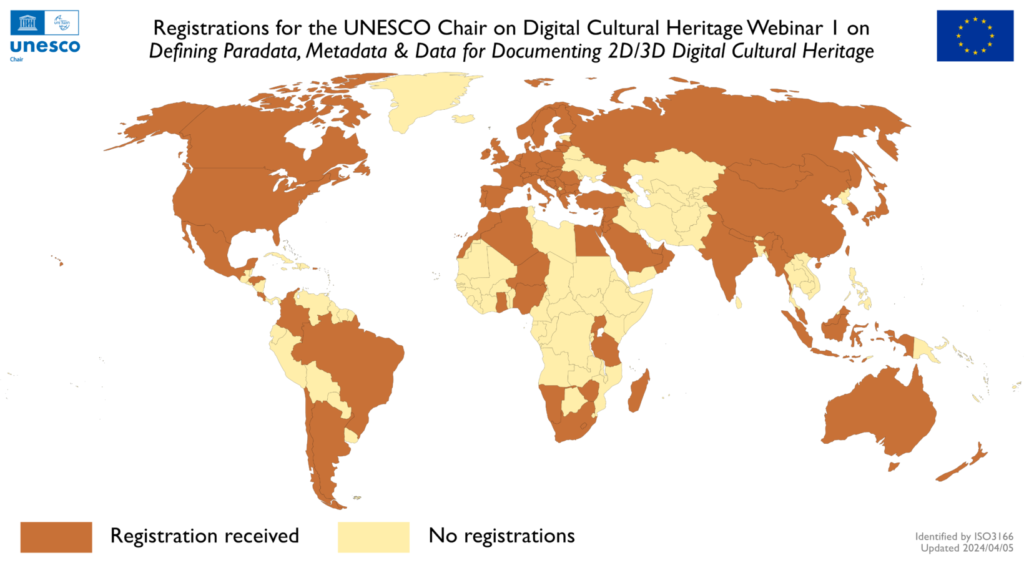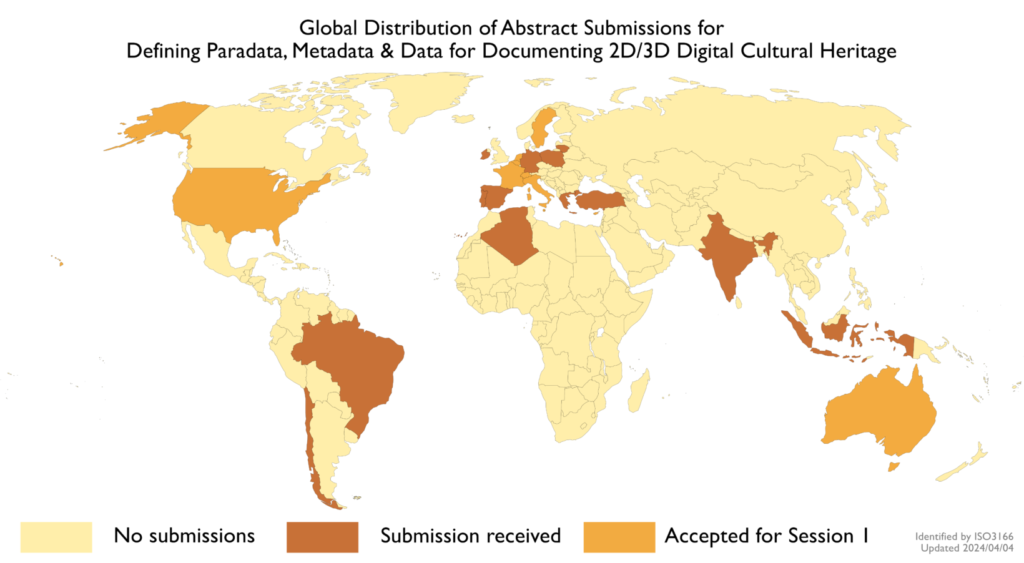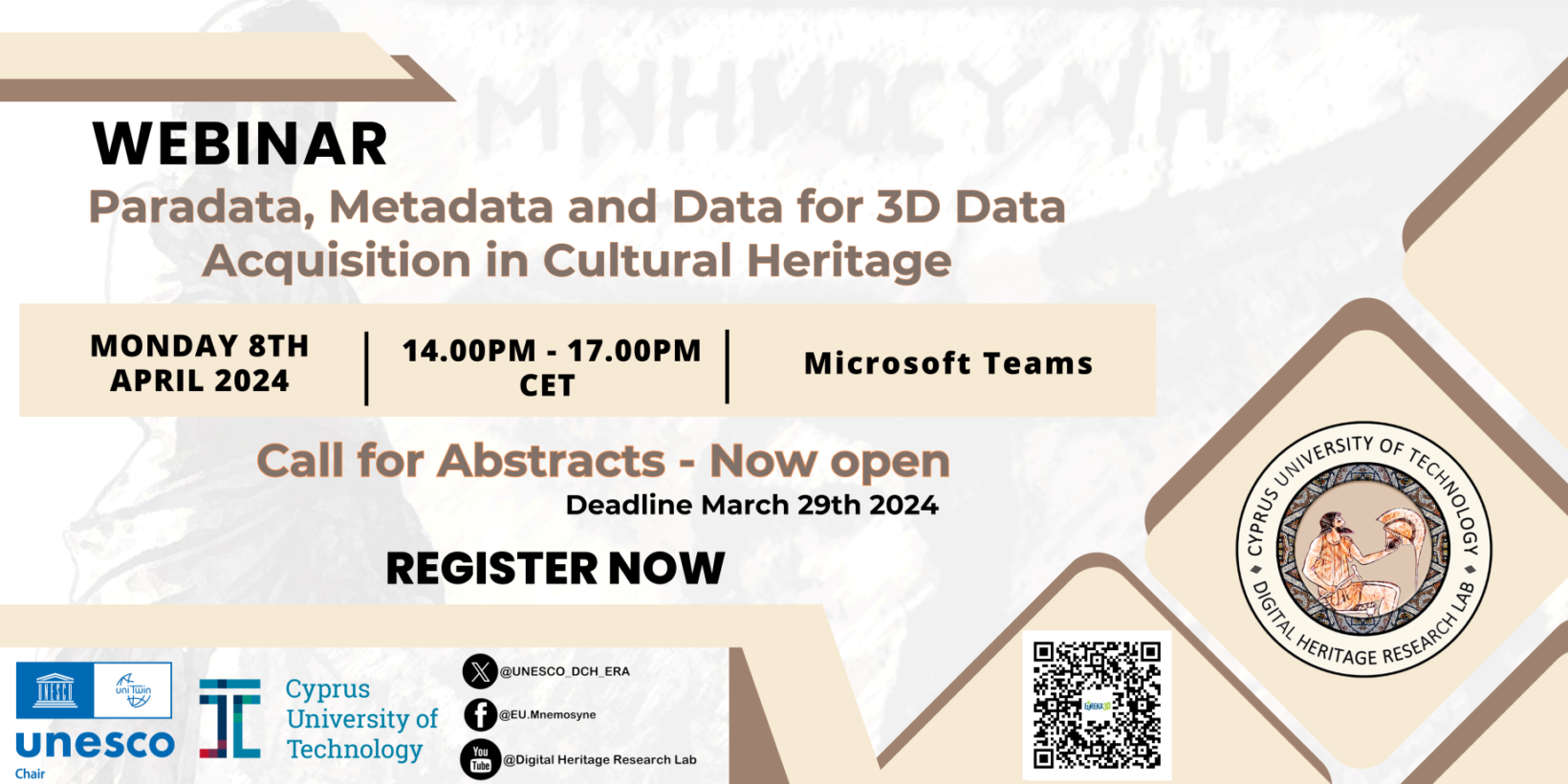EVENT: Defining Paradata, Metadata & Data
ON-LINE WORKSHOP Defining Paradata, Metadata & Data
for Documenting 2D/3D Digital Cultural Heritage
WHEN: 8th of April 2024; 14:00 -17:00 CET (UCT+2)
WHERE: Online via MS Teams invitation
HOW: Register online for this event HERE by the 5th of April 2024
WHAT: Download the latest agenda for the event HERE
The UNESCO Chair on Digital Cultural Heritage, in cooperation with the Earth Observation Research lab (EOCult), the Mechanical Engineering Design & Additive Manufacturing Laboratory at the CY University of Technology, the EU CLARIAH-CY research infrastructure, the ARTEST and CREAMS projects, the CY-Eureka3D competence center in Digital Heritage, the EU Project Digital Europe EUreka3D, as well as the Connecting-RPF and the EU HE Engineer are organising a unique Webinar dedicated to the topic of Paradata, Metadata and Data in the domain of 3D digital Documentation in Cultural Heritage.
Since its adoption in 2006 as part of the London Charter for the Use of 3D Visualisation in the Research and Communication of Cultural Heritage as a method for transparency in the creation of scholarly 3D Cultural Heritage assets, the adoption from ICOMOS of the Seville Charter in 2017 and the approval from the European Commission of the EU VIGIE2020/654 Study results on the quality in 3D digitisation of tangible cultural heritage, as a set of parameters for the estimation of the complexity in Data Acquisition of tangible objects, the concept of Paradata has appealed to many aspects of the digital documentation of the past; from expressing alternative interpretations, probability or confidence in visual-based heritage research to providing a basis for robust scholarly interrogation, and from describing workflows, data acquisition methods and parameters to supporting sustainability and high quality of data and its preservation approaches.
Now widely seen, along with Metadata and geometrical data, as part of the trinity that indicates high-quality 3D digital resources, both for enriching 3D assets, creating knowledge and promoting reusability, the Digital Cultural Heritage community still lacks a definitive description and differentiation of what Paradata and Metadata are, their benefits to stakeholders, owners, the multidisciplinary DCH community, digital scholarship, and compliance with the European Commission Recommendation for the collection of 3D-digitised cultural heritage assets.
This workshop will bring together professionals from the spectrum of Digital Cultural Heritage practice to share their experiences of using and working with Paradata seeking to lay down a common understanding of Paradata as a first step towards a community-built set of standards and expectations for its application to 3D documentation and the creation of knowledge.
If you have worked with Paradata and Metadata within any 3D Digital Cultural Heritage context, we cordially invite you to submit an abstract for presentation at the workshop. Topics under consideration are, but not limited to:
-
- The intersection between Paradata, Metadata and Data.
- Paradata as a tool for transparency in scholarly research
- Economic value and impact of Paradata
- Structured Paradata approaches
- How Paradata can help to create and preserve high quality 2D/3D data
- Paradata accessibility and discovery methods
- Case studies of Paradata link to Metadata implementation
- Paradata representation in 2D and 3D data acquisitions and visualisations
- Tools, practices or solutions supporting Paradata recording
Authors of selected abstracts will be invited to submit full papers to a new open-access publication under the series of Lecture Notes in Computer Science, Springer-Nature: “3D Research Challenges in Cultural Heritage – Volume V: Paradata, Metadata and Data in Digitisation“.
The registration to the online event, and the Gold Open Access book publication are free of charge and sponsored by the UNESCO Chair on Digital Cultural Heritage at the Cyprus University of Technology in Limassol and EUreka3D.
*** CALL FOR ABSTRACTS NOW CLOSED *** Abstracts should be no larger than one side of A4 and can be submitted via email to [email protected] no later than the 29th March 2024.
Who is participating?
Current registrations: 650 from around the world. Is your country represented?

Received abstract submissions: 55 from around the world


